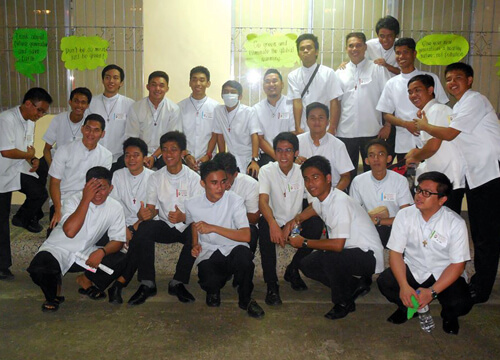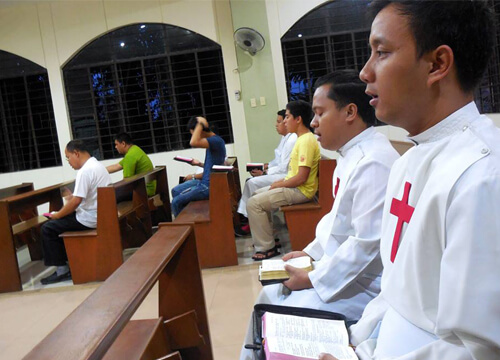The task of religious formation does not end with perpetual profession. Religious formation involves a life of continual spiritual/religious growth and human maturation.
The extent of permanent formation is not circumscribed by an aggiornamento of knowledge or by the acquisition of professional abilities. It encompasses all the life of the individual as a person and as a religious, and, has as its objective the constant renewal of his living and doing.
Permanent formation addresses
a) the five year period immediately after perpetual profession as these religious experience the joys and sorrows that are consequent to their full insertion into the ministry
b) the middle age period when religious are charged with satisfaction, and vulnerable to hidden dangers as well. It is a period in which the riches of experience are often juxtaposed with a drip in enthusiasm
c) the approach of old age and death that carries its own opportunity for growth and also offers moments of discouragement and spiritual resignation.
Permanent formation can be realized in an adequate fashion if it is organized in a systematic way. It has to become an integral part of the program of the Order, of the Province, of local communities, and of individual religious.

As has been observed, the first five years of perpetual profession of a religious is always a period of balancing the living out of the different aspects of religious life. A young religious who plunges himself full blast into the ministry always tends to get excessively immersed in it. There are instances when he may even get “burned out” due to the inability to integrate well in his person the different aspects of religious life. In reality, the greater percentage of religious who withdraw from religious life come from the group of young religious. Religious who are still very young in the vowed life undoubtedly need guidance and further formation.
The Program
67.0 The formation of young Camillian religious of the Province/Delegation shall continue systematically throughout the first five years of solemn profession.
68.0 The Young Camillian Religious program shall be under the supervision of the Secretariat on Formation. The Provincial Superior shall appoint the YCR adviser/s who shall report to the Secretariat of Formation and shall be responsible for coordinating and guiding the YCR formation process.
69.0 In a spirit of cooperation and support of the YCR formation process, the Director of On-going Formation shall properly coordinate with the local superior of the community where the religious undergoing the said program is assigned.
The Provincial Superior with his council serves as overseer. They enable the young religious to formulate their own program, which they will eventually evaluate. They allocate resources for the implementation and upkeep of the YCR program.
The Adviser of YCR is a religious appointed by the Provincial and his council who hold him responsible for monitoring and guiding the YCR in their formation processes as planned and approved by the group. He may evaluate the program and give recommendations. He must be a member of the Provincial Council to facilitate faster response to the concerns of the YCR.
The Local Superiors serve as “formators”, companions to the young religious in their respective communities. They encourage and enable each young religious in their communities to participate fully in the YCR program. They see to it that the whole community where the young religious is assigned understands that the YCR formation program is a priority.
Activities:
A. Enhancement and maintenance of a sound spirituality through:
1. Attendance at recollections and retreats organized by the group and/or by the Province
2. Organization and attendance at conferences, seminars, group sharing that pertain to the vowed life and the Camillian spirituality
3. Organization and attendance at human growth and development sessions
4. Regular visit to one’s confessor and spiritual director
B. Enhancement and maintenance of a healthy fraternal life through:
1. Structured occasions for informal or formal sharing
2. Regularly scheduled meetings, light moments and recreation
3. Deliberately scheduled community visitations
4. Remembrance of the significant dates of the members and other religious (birthdays, anniversaries, etc.)
5. Dissemination of information and minutes of the meetings to each member and other communities
6. Awareness of and concern for the extreme difficulties of other communities and extension of concrete responses of charity to said difficulties
C. Enhancement and maintenance of an effective ministry (active participation and response to the signs of the times) through:
1. Organization of and/or attendance at forums or small group discussions on moral and social issues affecting the sick and the poor and active participation in advocacy apostolate for their cause
2. Guided immersion with the “last, the least, and the lost”—the modern anawim of God, to learn how to serve them more effectively
3. Attendance at technical and professional trainings helpful for the exercise of the health care ministry
4. Encouragement for religious whose apostolates are not in direct contact with the sick to find time for opportunities of direct presence to the sick person
5. Support for the Primary Health Care Program and the Justice, Peace and Integrity of Creation (JPIC) Desk
6. Consciousness of the social conditions/environment and sustained effort at integration in the Local Churches where our local communities are based.
Religious who are sick and elderly continue to undergo on-going formation, which gives them the opportunity to appreciate life amidst the difficult situation they are experiencing. On-going formation enables them to experience and realize that they are one with Christ’s Paschal experience and to accept this as a new expression of consecration. This Program also offers them the chance to receive support from their confreres in the religious community while they themselves inspire other religious to a greater fidelity to the life of consecration. Religious are considered elderly when they reach the age of sixty-five.
Objectives:
A. To strengthen the faith of the sick and elderly religious, and to enable them to renew the meaning of their religious consecration.
B. To create an atmosphere of brotherly support and to extend material support as needed, from which great comfort could be felt by the sick and the elderly religious.
C. To assist the sick and the elderly religious in integrating life’s experiences with a life of commitment to God.

One of the problems being tackled with increasing insistence in the area of formation is the gap between formation provided in formation houses and the required competency in a specific ministry entrusted to a specific religious. Young religious or new perpetually professed religious feel incompetent in assuming responsibility on the ministerial level due to their lack of adequate preparation for performing a given task.
This stage of formation, therefore, is designed for all religious who are qualified and willing to study and aim for a relevant academic degree that will prepare him for more effective ministry. Generally, qualified religious who will undertake or be asked to undertake this program must have at least three years of experience in the ministry. It is believed that the three-year experience would have given the religious a sufficient grounding and foundation in the religious and ministerial life that will help ensure a more fruitful study.
Objectives:
A. To equip the qualified religious with the necessary knowledge and skills for a more effective ministry.
B. To build up the capability of the Province in the exercise of its various ministries.
It is imperative that all religious must have adequate preparation for a more effective ministry. Religious who are assigned as formators as well as those engaged in the healthcare ministry must undergo special studies for such work. Indeed, it is important that all religious must endeavor to acquire the specific education necessary to carry out effectively their apostolate within the Camillian ministries (Const. 85). This for sure benefits all religious who avail themselves for the program. It will contribute to the integrity of their life (PC 18), and will prepare them for the specific mission of the Order in today’s context.
This specialized formation is part of the constant and progressive development in the life of the religious. It enriches not only spiritual but also cultural, psychological, and social values, which contribute to the full realization of life as a person and a religious (EE, 44 & 45). While this program is offered to some religious in the Order, it must also be noted that each religious has the task to earnestly strive for perfection in the area of spiritual and professional development even outside the specialized formation program (PC 18). With such preparation, religious are hopefully led to the total dedication to God in the service of Christ’s mission (VC65).